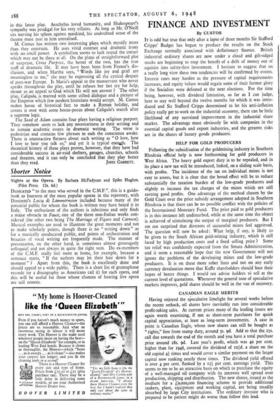FINANCE AND INVESTMENT
By CUSTOS
IT is odd but true that only after a lapse of three months Sir Stafford Cripps' Budget has begun to produce the results on the Stock Exchange normally associated with deflationary finance. British industrial ordinary shares are now under a cloud and gilt-edged stocks are beginning to reap the benefit of a drift of money out of equities into safety-first investment. I hesitate to suggest that on a really long view these two tendencies will be confirmed by events. Interest rates may harden as the pressure of capital requirements increases, and equity -values would regain some of their former glory if the Socialists were defeated at the next elections. For the time being, however, with dividend limitation, so far as I can judge, here to stay well beyond the twelve months for which it was intro- duced and Sir Stafford Cripps determined to let his anti-inflation
policy really get to work on the industrial economy, there can be little likelihood of any sustained improvement in the industrial share
market. The advantage must obviously lie with companies in the essential capital goods and export industries, and the greatest risks are in the shares of luxury goods producers.
HELP FOR GOLD PRODUCERS
Following the subsidisation of the goldmining industry in Southern Rhodesia official help is now forthcoming for gold producers in West Africa. The heavy gold export duty is to be repealed, and in its place a new tax will be introduced, linked, on a sliding scale basis, with profits. The incidence of the tax on individual mines is not easy to assess, but it is clear that the broad effect will be to reduce substantially the taxation burden of the low-grade producers and slightly to increase the tax charges of the mines which are still earning good profits. One advantage of the method chosen by the Gold Coast over the price subsidy arrangement adopted in Southern Rhodesia is that there can be no possible conflict with the policies of the International Monetary Fund. The price paid to gold producers is in this instance left undisturbed, while at the same time the object is achieved of stimulating the output of marginal producers. But I am not surprised that directors of successful mines feel aggrieved. The question will now be asked : What help, if any, is likely to be given to the South African gold-mining industry, which is still faced by high production costs and a fixed selling price ? Some tax relief was confidently expected from the Smuts Administration, and it seem a reasonable hope that the new Government will not ignore the problems of the developing mines and the low-grade producers. It is on these more sober lines and not on any early currency devaluation move that Kaffir shareholders should base their hopes of better things. I would not advise holders to sell at the current level of quotations. Whenever the general tone of speculative markets improves, gold shares should be well in the van of recovery.
CANADIAN EAGLE MERITS
Having enjoyed the speculative limelight for several weeks before the recent setback, oil shares have inevitably run into considerable profit-taking sales. At current prices many of the leading issues are again worth examining, if not as short-term purchases for quick capital appreciation, at least as long-term investments. A case in point is Canadian Eagle, whose new shares can still be bought as "rights," free from stamp duty, around 3s. 9d. Add to that the 25s. call due towards the end of the month and you have a total purchase price around 28s. 9d. Last year's profit, which was 4o per cent. higher than for 1946, covered the dividend of Told. a share on the old capital 4+ times and would cover a similar payment on the larger capital now ranking nearly three times. The dividend yield offered is over 4 per cent, flanked by a 12+ per cent. earnings yield. This seems to me to be an attractive basis on which to purchase the equity of a well-managed oil company with its interests well spread over production, shipping and distribution. The new shares, issued as the medium for a £9,000,000 financing scheme to provide additional tankers, plant, equipment and working capital, are being steadily absorbed by large City institutions. The ordinary investor who is prepared to be patient might do worse than follow this lead.


































 Previous page
Previous page